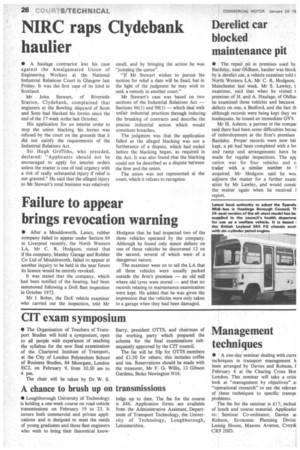NIRC raps Clydebank haulier
Page 28

If you've noticed an error in this article please click here to report it so we can fix it.
• A haulage contractor lost his cage against the Amalgamated Union of Engineering Workers at the National Industrial Relations Court in Glasgow last Friday. It was the first case of its kind in Scotland.
• Mr John Stewart, of Riverside Station, Clydebank, complained that engineers at the Bowling shipyard of Scott and Sons had blacked his lorries since the end of the 17-week strike last October.
His application for an interim order to stop the union blacking his lorries was refused by the court on the grounds that it did not satisfy the requirements of the Industrial Relations Act.
Sir Hugh Griffiths, who presided, declared: "Applicants should not be encouraged to apply for interim orders unless the matter is one of real urgency with a risk of really substantial injury if relief is not granted." He said that the alleged injury to Mr Stewart's total business was relatively small, and by bringing the action he was "jumping the queue".
"If Mr Stewart wishes to pursue his motion for relief a date will be fixed, but in the light of the judgment he may wish to seek a remedy in another court."
Mr Stewart's case was based on two sections of the Industrial Relations Act — Sections 96(1) and 98(1) — which deal with unfair industrial practices through inducing the breaking of contracts and describe the precise industrial action which would constitute breaches.
The judgment was that the application failed as the alleged blacking was not a furtherance of a dispute, which had ended before the blacking began, as required in the Act. It was also found that the blacking could not be described as a dispute between the firm and the union.
The union was not represented at the court, which it refuses to recognize.




























































































